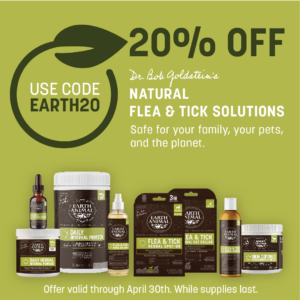After a long, cold winter, we are looking forward to warmer temperatures, sunnier days, and the beautiful blooms of Spring gardens. We can’t wait to get outside and enjoy some sunshine, and we’re sure that our animal companions are as antsy as we are to spend more time outdoors, too. But as we head into Spring, it’s important to keep in mind that, just like people, animals can also suffer from seasonal allergies, and we need to be aware of what the symptoms of these allergies might look like in our companion animals so that we can take the appropriate steps to help them get relief.
Allergy Symptoms
According to PetMD, there are five primary symptoms of seasonal allergies in animals. When exposed to allergens, your animal’s eyes will get irritated, resulting in scratching and pawing at the eyes, eye redness, and discharge; ears will be itchy, causing pawing and head shaking; irritation of the nasal passages will cause your animal to sneeze and have a runny nose; irritants and nasal discharge will collect in the throat leading to coughing and gagging; and itchy skin will lead to excess scratching that can cause hot spots on the skin, hair loss, and infection. If you notice any of these symptoms in your animal companion, make an appointment with your veterinarian to get it checked out. While these symptoms are typical of allergies, there are other conditions that could be causing them as well. For example, if your animal is suffering from dry, itchy skin, it may be allergies or it may be a result of the dry winter air. Your veterinarian can determine for sure if the cause of your animal’s discomfort is allergies and provide appropriate advice and treatment.
How to Help Your Allergic Animal Get Relief
If your veterinarian is able to pinpoint the exact culprit of your animal companion’s allergies, the first step to helping your animal feel better will be to avoid that allergic trigger. For example, if tree pollen is to blame for your animal’s discomfort, avoid taking your animal out to a wooded area for exercise. Instead, try visiting a beach, if possible, or stick to neighborhoods with fewer trees. Always avoid going out at high pollen times, which tend to be in early morning and early evening. And stay inside on very dry, windy days when pollen is best able to travel farther distances through the air. Regardless of where or when you go outside, limit the amount of time you spend out there, and wash your animal as soon as you get back inside to reduce the chance that any pollen that may have gotten stuck on him will cause a reaction. Additionally, keep all bedding and toys inside, and clean them frequently to remove dust.
Depending on the severity of your animal’s allergic skin reaction, bathe him at least once a week with an appropriate shampoo and apply conditioner or a topical cream. A good choice is Earth Animal’s Herbal Skin Relief balm, which naturally soothes irritated skin and cools hot spots. Since hot spots are uncomfortable for your animal and can lead to infections, it is important to try to prevent them from forming in the first place. Earth Animal’s Allergy and Skin Daily Allergy Protection given twice a day throughout allergy season can help to alleviate allergic skin irritations before they lead to the excess scratching that can cause hot spots.
If your animal’s eyes are red and itchy, start by applying over-the-counter eye drops in his eyes. The ones made for red-eye relief in humans are also safe for animals, or, for an even gentler all-natural option, try Earth Animal’s Vital Eye. It’s an organic herbal blend that calms irritations and supports eye health. To help with discharge, Earth Animal’s Clean Eyes Eye Wash is an herbal formula that reduces irritation, reduces swelling, and removes discharge.
Keep your animal companion’s ears clean and clear of excess hair to avoid build-up of allergens in the ear. Use a gentle ear flushing solution like Earth Animal’s Herbal Ear Wash to clean inside the ears, especially after swimming or bathing.
Prevention is Best
We always say that it is better to prevent a problem than to treat it. For skin conditions caused by seasonal allergies or just dry winter air, you have several choices for prevention. Of course, the first step is diet. Make sure that your animal companion is well-hydrated and eating healthy, balanced meals to take care of his skin from the inside out. Externally, consider giving your animal a colloidal oatmeal bath by adding about three cups of oatmeal to his bath water. Pour the mixture over him, massage it into his skin, let it sit as long as he’ll let it, and then rinse. You can also try massaging a small amount of coconut oil onto his skin for a silky conditioning treatment.
As we look forward to warmer and sunnier days ahead, keep in mind that our animals can have allergies, too, but with some care and attention we can all still enjoy the benefits of getting outside this Spring.







